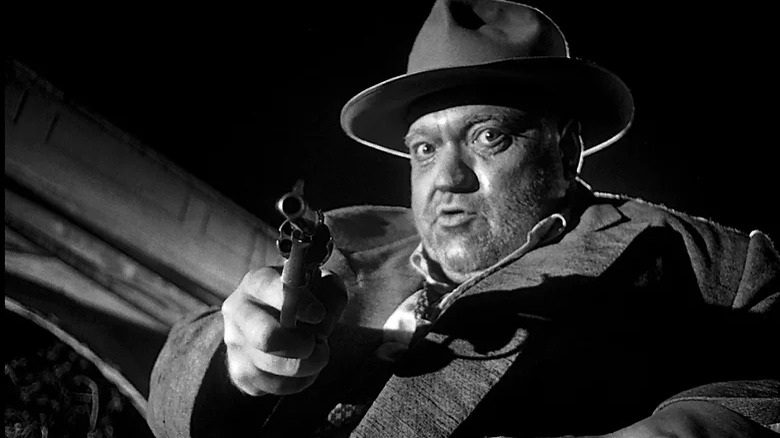The Whale's Oscar Nomination For Makeup Is Insulting, Frankly
The 2023 Oscar nominations are finally here, full of surprises across the board, both positive (Andrea Riseborough! Brian Tyree Henry!) and unfortunate (where's the love for "RRR" or "Decision to Leave?"). Some truly excellent films received well-deserved and ample recognition, like the wonderfully ecstatic "Everything Everywhere All at Once" and the haunting "The Banshees of Inisherin." One not-so-surprising turn of events is the Best Actor nomination of Brendan Fraser in Darren Aronofsky's controversial entry "The Whale," based on the play by Samuel D. Hunter.
"The Whale" follows Charlie, a 600-pound English instructor with a good and vulnerable heart, who is literally eating himself to death following the tragic loss of his boyfriend and his estrangement from his furious daughter Ellie (Sadie Sink). The film sees Charlie routinely embarrassed, rejected, engaged in acts of clear self-hatred, and on the receiving end of a parade of hate speech over his weight in the film's lean but oh-so-long 117-minute runtime.
Key to Fraser's transformation into Charlie for the film is the use of an extensive set of prosthetics, often described as a 'fat suit,' as the foundation to build Fraser into Charlie's frame. For their efforts to make the body suit and makeup realistic, the makeup team behind "The Whale" earned the film's second of three Oscar nomination (Hong Chau earned a Best Supporting Actress nod). Good intentions notwithstanding, Hollywood's history of using fat suits for comedy, drama, or otherwise needs to stop, and awarding a team for building one is, frankly, insulting. The Academy needs to do better and retire the fat suit entirely.
Hollywood's obsession with prosthetic fatness
Hollywood has a long history of increasing actors' visible size to play the roles of larger human characters, for both dramatic and comedic intent. One traditional way is for actors to actually gain weight through dietary changes, like how Robert De Niro gained 60 lbs for "Raging Bull" or Christian Bale when gained over 40 lbs for both "American Hustle" and "Vice." The other route, often used to add even more dramatic amounts to the frames of actors, is to create large body suits to exemplify large, pregnant, or fat bodies ... and often for the purpose of ridicule, abuse, and so-called comedy.
Fat suits were worn by Orson Welles for dramatic effect in the 1958 noir "Touch of Evil," but their most infamous use is intended for either comedic effect or to showcase how far a character's fortunes have fallen. The former is shown time and again on numerous occasions, like 1996's "The Nutty Professor," the Austin Powers films, or to make jokes at young Monica's expense in "Friends." The latter can be seen in much of Thor's arc in "Avengers: Endgame," or the plight of all humanity in the background of "WALL-E," associating a rise in weight with a fall from grace.
In these films, a character's physical girth is too often treated with disrespect, as unattractive, or as a source of ridicule. Large characters are portrayed as buffoons, slobs, or with derision. Fat suits are frequently used in these stories to increase characters' weights beyond what diet and short time frames could do, often in productions that reduce characters to their weight or weight loss struggles, and in ways that typically reinforce these and other terrible stereotypes.
A blunt reproduction of tired stereotypes
"The Whale" was intended to take on issues of eating disorders and extreme weight gain with empathy and sincerity, according to the creative team behind it. Samuel D. Hunter wrote the play inspired by personal experiences with weight gain and self-medication through food. Brendan Fraser certainly approaches Charlie with humanity and subtlety, fueled by his own history of struggles with weight gain and disordered eating. Prosthetics designer Adrien Morot used 3D printing technologies to make prosthetics that were "subtle and unnoticeable." Noble intent notwithstanding, "The Whale" isn't the film that can transcend this long history of Hollywood stereotypes.
Charlie is written as an amalgamation of myriad traditional stereotypes. Not just "morbidly obese," but a week from intentionally eating himself to death from self-hatred. Practically immobile, nearly every single aspect of his character centers around food, his size, or its consequences, from refusing to be on camera at work to having difficulties with masturbation. Fraser makes moments of nuance to this trope-consumed character as if by magic, but not enough to elevate the film when nearly every minute of the film subjects Charlie to a constant stream of self-hatred, embarrassment, or insults from other characters. These are compounded by directorial choices made to remind audiences that Charlie is only his weight, from horror music played over his eating to framing his attempts to stand in ways that emphasize his size instead of his humanity. "The Whale" doesn't transcend Hollywood's assorted pack of stereotypes, it purifies and concentrates them with the prosthetics-laden character in the center of it all.
We should be done with the Hollywood fat suit
It's time to retire the fat suit forever, and especially time to jettison giving Oscar nominations to films for using a kind of prosthetic almost exclusively designed for stereotypical, reductive, and dehumanizing characterizations of people in larger bodies. Effects legend Rick Baker won an Academy Award for the slew of fat suits created for 1996's "The Nutty Professor." Nearly three decades later, one would expect the Academy to be more thoughtful around these issues, but better prosthetics are still locked into these same tired traditions — good intentions and talented designers notwithstanding.
People with larger bodies frankly deserve better than to see fat characters, characters who look like them or their loved ones, played for laughs or revulsion because of their weight, their body shape, or for simple acts like eating. No one should go to "Avengers: Endgame" and see the first MCU hero with their body type played for laughs, theaters becoming a cacophony of laughter and judgment. The answer isn't that we should have 'no more large characters,' but rather that we need better representation. Cast actors as rich characters whose arcs don't center on weight and food. Create more on-screen fat badasses and feature large characters with respect, power, and sex lives!
Most importantly, throw out the tradition of using fat suits to create yet another fat character whose on-screen purpose is to suffer weight-based self-hatred, embarrassment, and to be subject to abuse. Get rid of fat suits and certainly stop giving them Oscars.



